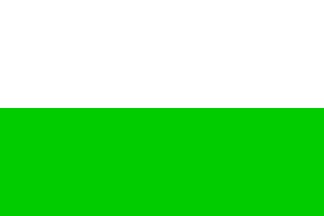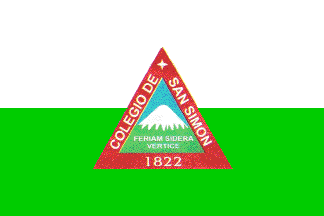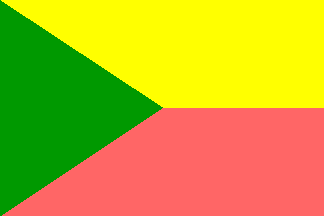 klaus-michael schneider
klaus-michael schneider
Keywords: education | colombia |
Links: FOTW homepage | search | disclaimer and copyright | write us | mirrors

Last modified: 2021-08-26 by  klaus-michael schneider
klaus-michael schneider
Keywords: education | colombia |
Links: FOTW homepage |
search |
disclaimer and copyright |
write us |
mirrors
See also:
 image by Ivan Sache, 28 March 2009
image by Ivan Sache, 28 March 2009
"Colegio San Sebastian" was founded at Cali in 1994
by Liliana Osorio Garcia.
The flag of the institute, as described on the website of
the institute, is horizontally divided blue-white.
Blue represents represents the immensity of the sky and of the
sea.
White represents transparency and freshness, as well as
intellectual and spiritual resources.
Ivan Sache, 28 March 2009
 image by Ivan Sache, 29 March 2009
image by Ivan Sache, 29 March 2009
"Colegio San Simón" was founded at Ibagué,
Department of Tolima, on 21 December 1822 (Decree of the
Executive No. 86-5), reorganized on 30 March 1837 (Presidential
Decree) and reestablished in 1887 (Law No. 12). Its legal status
was eventually confirmed by the State Council on 8 October 1942.
Originally housed in a former Dominican convent built in 1722,
the institute moved to its modern seat in 1948. In 2002, it
merged with three other institutes to form "Institución
Educativa Colegio de San Simón".
The flag of the institute was shown graphically on Cesar
David Gastelbondo Calderón's blog, as horizontally divided
white-green.
Ivan Sache, 29 March 2009
 image by Ivan Sache, 16 July 2014
image by Ivan Sache, 16 July 2014
Another blog shows the flag as horizontally divided white-green with the
institute's emblem in the middle:
http://fabioxih3.blogspot.fr. The mountain represented on the emblem must be
the Nevado del Tolima volcano (5,215 m). The Latin motto "Feriam sidera vertice"
comes from Horace's Odes (I:1 The Dedication : To Maecenas), reading "My head
will be raised to touch the stars".
There is, however, no evidence that
the flag is actually used with the emblem. Photos taken during an official
ceremony shows the flag without the emblem.
http://sansimoncreativo.blogspot.fr/2013/03/conmemoracion-y-celebra-cion-del-dia-de.html
Ivan Sache, 16 July 2014
 image by Ivan Sache, 9 November 2010
image by Ivan Sache, 9 November 2010
Colegio San Tarsicio, located in Bogotá, was founded on 13 February 1961 by
Ernesto Solano and Cecilia Restrepo de Carrizosa. The institute is named for the
early Christian martyr St. Tarcisius (3rd century, only known to us by a poem
written by Pope Damasus I).
The symbols of Colegio San Tarsicio are described in the institute's "Proyecto
Educativo Institucional" (PEI - Institutional Education Project), as follows:
Chapter 1. Fundamental principles.
[...]
1.8.3. Flag.
The flag of the institute is based on the papal flag, whose colors are white and
yellow. White means clarity, limpidity, truth; this color, which assimilates and
reflects all the other ones, which is the color of the host, and which
symbolizes the Eucharist, shall be placed above everything. Dark [lit. "burned"]
yellow means life, sun, force, power, energy, maturity, harvest. These two
stripes, white and yellow, are separated by a coffee brown stripe symbolizing
the soil, the space where we live, our universe; on the white stripe in the left
part, the institute's coat of arms, which is made with the same three colors.
1.8.4. Coat of arms.
Inspired by a German stamp representing St. Tarcisio, designed by the noted
religious artist K. Beuron. With a triangular shape and symbolizing the Trinity:
Father, Son and Holy Spirit. In the triangle: the chalice and the Saint Host
surrounded by rays. In the middle, the letters [chrism] meaning "Jesus, Hostia
Santa". In the base "San Tarsicio": Martyr of the Eucharist.
Source:
http://www.santarsicio.edu.co/descargas/manual09.pdf
Ivan Sache, 9 November 2010
 image by Ivan Sache, 21 September 2018
image by Ivan Sache, 21 September 2018
Colegio San Viator was established in February 1963 in Tunja (Boyacá
Department) by the Clerics of Saint Viator, a congregation founded in France in
1831 by Father Louis Querbes (1793-1859). The Viatorians were introduced from
the US to Colombia on 29 September 1961 by Cardinal Luis Concha Córdoba
(1891-1975), Archbishop of Bogotá (1959-1972).
http://www.sanviatortunja.edu.co/
School website
The institutional
flag of Colegio San Viator is composed of three diagonal stripes, blue, white
and red, charged in the center of the white section with the school's coat of
arms.
The colors evoke the French flag, recalling that the congregation
of the Clerics of Saint Viator was founded in France, and the US flag, recalling
that the Viatorians who founded the school came from the US. The ascending
diagonals are a symbol of commitment and excellence guided by the principles of
the Gospel. Blue represents introspection, whose fruits are connected with
knowledge, tranquillity and sincerity. White represents kindness, optimism and
nobleness. Red represents energy and vitality shared by the students and
teacher, as well as the human values of the whole community.
The coat of
arms is made of a shield divided into three quarters per pairle inverted,
referring to one God in three Divine Persons. Each quarter bears one of the
school's colors. The upper left quarter, blue, is charged with a red lion and a
white fleur-de-lis, taken from the coat of arms of the town of Lyon, cradle of
the Viatorians. The lion rampant represents fighting spirit and Christ as the
Lion of Judah. The fleur-de-lis is connected to the mission and influence of the
Christian religion in the Western world, and a symbol of the nobleness of the
Viatorians' achievements. The upper right quarter, white, is charged with a
double-headed eagle symbolizing the town of Tunja. The lower quarter, red, is
charged with the coat of arms of the Clerics of Saint Viator, made of the
letters "IHS" (Jesus Hominum Salvato; Jesus, Saviour of men) surrounded by the
motto "Sinite parvulos venire ad me” (Let the little children come to
me; Matthew 19:14), the whole surrounded by a crown of thorns recalling Christ's
passion and death. Beneath the shield a scroll inscribed with the school's name;
above it, a burning torch representing knowledge, truth and the Roman Catholic
faith.
http://www.sanviatortunja.edu.co/simbolos-institucionales/
School
website
Ivan Sache, 21 September 2018
 image by Ivan Sache, 04 December 2014
image by Ivan Sache, 04 December 2014
Institucion Educativa San Vicente De Paúl was established in 1960 in Puerto
Colombia (Atlántico Department), with the financial support of Caritas. Colegio
Distrital San Vicente de Paúl was established by Resolution No. 1,354 of 13
September 1999. The institute is named for St. Vincent de Paul (1581-1660,
canonized on 16 June 1737 by Pope Clement XII), aka the "Great Apostle of
Charity"..
The flag of the institute is horizontally divided white-green-red with a blue
triangle placed along the hoist and charged with a yellow star. White is a
symbol of peace, transparency and purity. Green is a symbol of the location of
the institute in the natural environment, surrounded by mangrove, and of its
planted garden. Red is a symbol of love, a legacy of the institute's patron
saint, characterized by an ardent charity preferentially dedicated to the poor.
Blue is symbol of the mangrove and of the sea. Yellow is a symbol of the sun and
its light that signals the way and shows the horizon. Jesus Christ is the sun of
justice that guides our steps towards infinity.
Source:
http://iedsanvicentedepaul.blogspot.fr/2013/08/simbolos-institucionales.html
- Institute's blog
Ivan Sache, 04 December 2014
 image by Ivan Sache, 03 October 2014
image by Ivan Sache, 03 October 2014
Institución Educativa San Vicente Ferrer was established in 2005 in San
Vicente Ferrer (Antioquia Department), succeeding Colegio General San Vicente
Ferrer, which had been established by Municipal Resolution No. 12 of 21 February
2000, as the merger of Liceo San Vicente Ferrer, Instituto Santa Teresita,
Colegio integral para Jóvenes y Adultos (CIJA), and Escuela Urbana Integrada
Cándido Duque Gómez.
The flag of the institute is horizontally divided red-yellow-green with a white
star in the middle. Red is a symbol of dynamism and movement. Yellow is a symbol
of light, of the sun, of action, life, immensity, and prosperity. Green is a
symbol of youth, hope, and vegetation. The star is a symbol of ideal and goal.
White is a symbol of purity, nobleness, and peace.
Source:
http://www.iesanvicenteferrer.edu.co/index.php/8-institucional?start=4 -
Institute's website
Ivan Sache, 03 October 2014
 image by Ivan Sache, 26 November 2014
image by Ivan Sache, 26 November 2014
Institución Educativa San Vicente was established in Palmira (Valle
Department) by Resolution No. 1,802 of 4 September 2002, as the merger
of Colegio Comercial San Vicente de Paúl, Centro Docente No. 5 San
Vicente, Center Docente No. 14 Mater Dei, and Centro Docente No. 15
Rosa Virginia Pelletier.
Escuela San Vicente de Paúl was established in 1894 by the Daughters
of Charity of St. Vincent de Paul, a congregation founded in 1633 by
St. Louise de Marillac (1591-1660, canonized on 11 May 1934 by Pope
Pius XI); this was the first school officially recognized in the town.
The flag of the institute is horizontally divided yellow-pink with a
green triangle placed along the hoist.
Yellow is a symbol of cognitive resources.
Pink is a symbol of innocence's elation, authenticity and transparency.
Green represents the youth and aspiration to a Christian education.
Source: http://www.sanvicente.edu.co/new/simbolos/ - Institute's website
Photos:
https://picasaweb.google.com/103442745258525099895/ENTREGABANDERAS
Ivan Sache, 26 November 2014